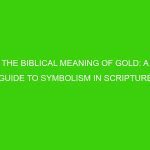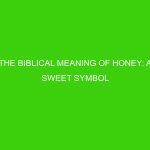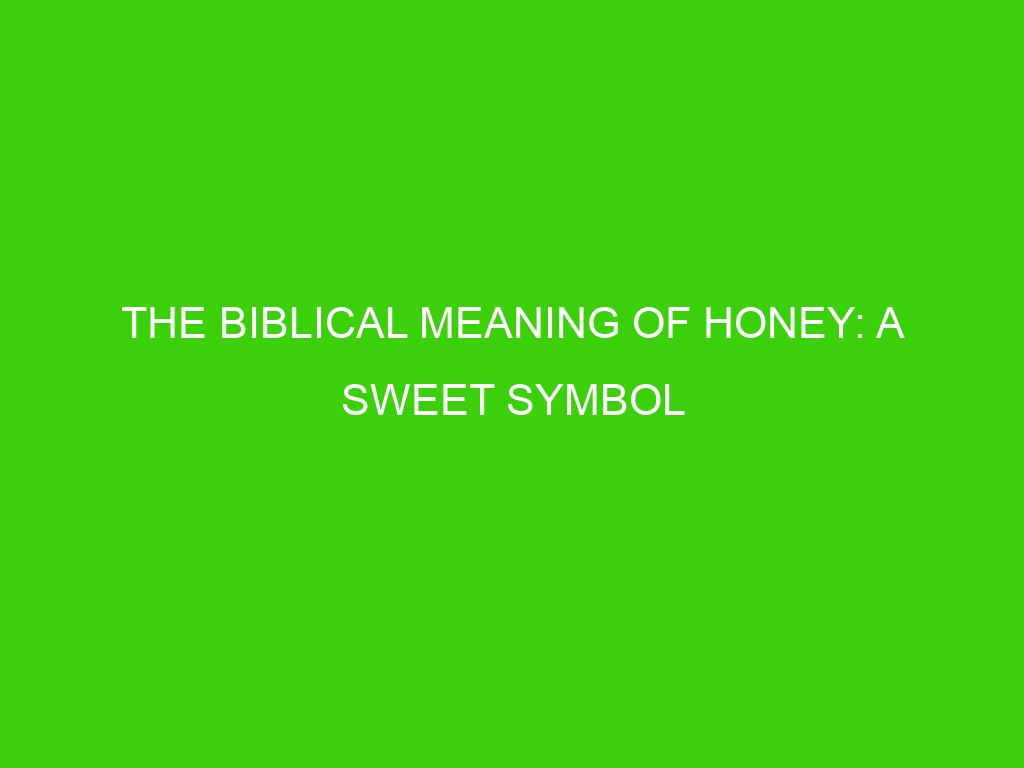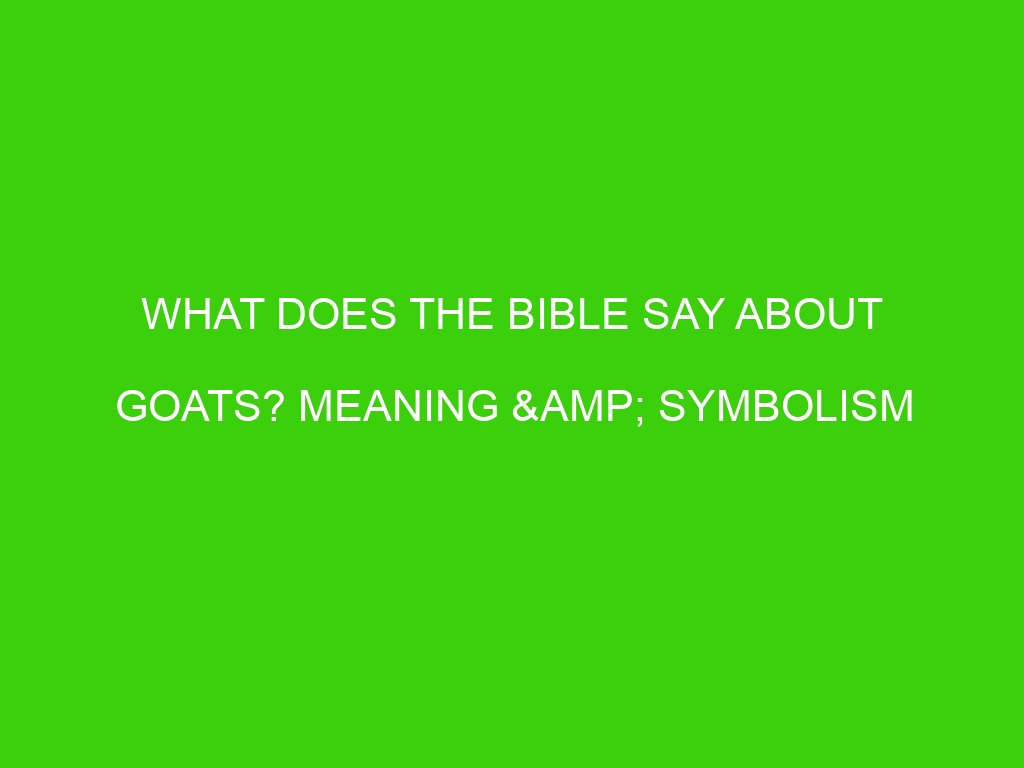You’re probably familiar with honey as that sticky sweet stuff you put in your tea or slather on toast.
But did you know that in the Bible, honey represents something deeper? For ancient cultures like those in the Bible, honey symbolized abundance, sweetness, and God’s blessing.
As you dive into this article, you’ll uncover the fascinating history of honey in Scripture – from the Promised Land overflowing with milk and honey to John the Baptist’s unusual diet of locusts and wild honey.
You’ll learn how honey and honeycombs are woven throughout the Bible as symbols of satisfaction, reward, and the sweet life God desires for His people.
Whether you’re a foodie, history buff, or just love a good Bible story, you’ll savor the meaningful depths behind this natural sweetener.
Get ready to taste the rich biblical meaning of honey!
Honey in the Bible: A Brief Overview
Honey is mentioned over 60 times in the Bible, used both literally and symbolically.
As a sweetener
In ancient Israel, honey was the main sweetener and was used in cooking and baking.
The Bible refers to Israel as a “land flowing with milk and honey” to illustrate its richness and fertility.
As a gift
Honey was considered a luxury and given as a gift.
Jacob sent honey as a gift to Egypt, and King Saul’s son Jonathan gave David honey.
In 2 Chronicles 31, honey is listed as a tithe offering.
As a metaphor
The Bible uses honey as a metaphor for sweetness, richness, and abundance.
God’s words are sweeter than honey (Psalm 119:103).
The Promised Land is a “land flowing with milk and honey” (Exodus 3:8).
Samson’s riddle contains a metaphorical reference to honey:
Out of the eater came forth food, And out of the strong came forth sweetness.
(Judges 14:14)
As medicine
Honey was used as an ointment for wounds and burns, and taken internally as a medicine.
King Hezekiah was prescribed a fig poultice and honey as treatment (2 Kings 20:7).
Proverbs 24:13 says honey can heal the soul.
With its natural sweetness and richness, it’s no wonder honey became such an important symbol in the Bible, used both literally and metaphorically.
For the ancient Israelites, honey represented nourishment, abundance, sweetness, and healing.
Honey continues to capture our imagination today as a natural, wholesome food.
Honey as a Symbol of Abundance and Prosperity
Honey was considered a symbol of abundance and prosperity in biblical times.
As a natural sweetener, honey was prized for its sweet taste and used as a sign of richness.
Possessing honey meant you had an excess of resources.
A Sweet Gift
Honey was such a cherished commodity that it was given as a gift to honor others.
Jacob sent honey as a present when he sought to appease his brother Esau.
Kings and nobles were also given honey as a lavish gift.
If you received honey, it showed you were esteemed and valued.
A Sign of Blessing
The promised land was said to be overflowing with milk and honey, a sign of its richness and fertility.
When the Israelites entered the promised land, the abundant honey was a symbol of God’s blessing and favor.
Honey represented the sweet life God had given his people.
Medicine and Healing
Not only was honey a delicacy, but it also had practical uses.
Honey was used as an ointment for wounds and aided in healing.
King Hezekiah was cured from a life-threatening illness by applying a paste of figs and honey.
So honey was a symbol of God’s healing power and mercy.
In many ways, honey epitomized the blessings of provision, favor, and wellbeing in the Bible.
No wonder honey, with its golden sweetness, was such an apt representation of prosperity, abundance, and God’s beneficence.
For the Israelites, honey was a reminder of the goodness of God and his faithful provision.
Honey Representing Sweetness, Joy and God’s Blessings
In the Bible, honey is used as a symbol for sweetness, joy, and God’s blessings.
The Promised Land is described as a “land flowing with milk and honey”—a metaphor for abundance and fertility.
When the Israelites finally entered Canaan after 40 years in the desert, the land was filled with wild honeybees and their sweet honey.
For the wandering Israelites, honey represented the sweet reward of faith after a long journey.
A Sweet Gift from God
Honey is portrayed as a natural gift from God to nourish His people.
The Bible describes Israel as “a land of olive oil and honey.” Olive oil and honey were two of the most prized agricultural products of Canaan.
By mentioning them together, the Bible emphasizes how God provided the best of the land for His children.
A Symbol of Joy and Blessing
Honey also signifies joy, pleasure and blessing throughout the Bible.
When Jacob blessed his son Asher, he proclaimed “Let Asher be blessed with children; let him be acceptable to his brethren, and let him dip his foot in oil.
Your shoes shall be iron and brass; as your days, so shall your strength be.” The image of Asher dipping his foot in oil is one of richness, abundance, and blessing.
Similarly, King David praises God for His “judgments…sweeter also than honey and the honeycomb.” The sweetness of honey is used as a metaphor for the pleasantness and desirability of God’s teachings and commandments.
As Psalm 19:10 proclaims, “The judgments of the Lord are true and righteous altogether.
More to be desired are they than gold, yea, than much fine gold: sweeter also than honey and the honeycomb.”
Honey in the Bible truly represents the sweet blessings of God.
It signifies the joy, abundance, and reward of faith in God’s promises.
No wonder the Promised Land of Canaan was described as a “land flowing with milk and honey!” For the Israelites, honey was a reminder of God’s faithful provision and the sweet life found in obedience to Him.
The Promised Land Flowing With Milk and Honey
The Bible describes the Promised Land as a place “flowing with milk and honey.” This poetic phrase symbolizes abundance, fertility and nourishment.
For the Israelites wandering in the desert, the image of a lush land overflowing with life’s sweetness would have seemed like a dream.
A Land of Fertility
The “milk and honey” metaphor refers to a place of agricultural plenty.
Bees produce honey from the nectar of flowering plants, so “honey” signifies an abundance of vegetation and greenery.
“Milk” comes from goats and cattle feeding on that lush foliage.
The Promised Land would be ideal for farming and raising livestock.
For the nomadic Hebrews, settling in such a fertile place after 40 years in the barren wilderness would be a welcome relief and reward.
They could finally stop wandering and build permanent homes, plant crops and establish their own society in the rich, well-watered soil.
A Symbol of Nourishment
On a more symbolic level, “milk and honey” represent nourishment, sustenance and sweetness.
Just as babies drink milk for essential nutrients, and just as honey adds sweetness to life, so the Promised Land would nourish the Israelites in body, soul and community.
They would no longer struggle in the harsh conditions of the desert, grasping for scarce, meager rations.
Instead, they could enjoy the richness of the land in fellowship together.
The milk and honey were a foretaste of the spiritual and social fulfillment they would experience in this new home.
A Promise Fulfilled
Most of all, the land of milk and honey symbolized God’s faithfulness.
He had promised to lead His people out of slavery to a place of their own, and now they stood on the brink of realizing that promise.
Despite their frequent faithlessness and complaining, God remained faithful.
The milk and honey were a reminder of His steadfast love and care for His people.
So for the Israelites, “a land flowing with milk and honey” epitomized God’s abundant blessings and the sweet fulfillment of His promises.
No wonder it seemed to them a glimpse of paradise.
Honey Mentioned in Key Biblical Events and Teachings
Promised Land of Milk and Honey
The Bible refers to Israel as the “land of milk and honey,” a land blessed with abundance.
When God promised to give the land of Canaan to the Israelites, he described it as “flowing with milk and honey” – a poetic way of saying it was fertile and productive.
The honey here likely refers to honey from wild bees, which was a sweet treat and symbol of prosperity.
Food for the Gods
In ancient cultures, honey was considered a delicacy and only eaten occasionally.
It was seen as a food fit for the gods and was used as an offering in religious rituals and sacrifices.
The Bible mentions honey as an offering, like when Abraham gave the three visitors milk, curds, and honey.
Honey was also used as a sweetener for foods used in religious festivals and sacrifices.
Samson’s Riddle
In the story of Samson, honey plays an important role in his riddle to the Philistines.
Samson said, “Out of the eater came something to eat, and out of the strong came something sweet.” The eater was a lion, the something sweet was honey, and the riddle was a reference to when Samson found honey in the carcass of the lion he had killed.
The Philistines were unable to solve the riddle, showing they were no match for Samson’s cleverness.
Sweet Words and Wisdom
The Bible uses honey as a metaphor for sweetness, pleasantness, and value.
The Psalms compare God’s words and wisdom to honey: “How sweet are your words to my taste, sweeter than honey to my mouth!” Proverbs also says, “Pleasant words are like a honeycomb, sweetness to the soul and health to the bones.” Just as honey is sweet to the taste, God’s wisdom and words nourish and enrich our lives.
Honey appears throughout the Bible, from the promised land to religious rituals to poetic metaphors.
This natural sweetener held great symbolic meaning for the ancient Israelites and remains a powerful biblical symbol of abundance, sacredness, cleverness, and wisdom.










